BLUEGRASS
NEWSLETTER
To
Receive the Bluegrass Newsletter Send an Opt-In Email Click Here
Please forward this to anyone you think would be interested in Bluegrass Music.
This is an "OPT-IN" newsletter that gets sent FREE by email to anyone requesting it.
![]()
Bill Monroe Christmas 1968
![]()
"Scroll Down to Read the Entire Interview"
Below is a short interview with
Jim Peva and Roland White
conducted by Jim Moss
12-11-05 after playing for them the recording
of
The Bluegrass Boys visit to Jim Peva's house December 14, 1968.
![]()
Jim Peva has attended over 38 years of Bean Blossom festivals. I met Jim when I first attended the
festival in 1973. I had hitch hiked from California, with my fiddle, to Indiana to see Bill Monroe
and the great Kenny Baker. What I found when I got there was a family of musicians and festival
supporters
who immediately took me in. I was amazed at their openness and generosity.
Bean Blossom was Bill Monroe's favorite turf and it was the site of the second
Bluegrass festival
ever. Jim Peva had the most popular campsite at the festival where one had no problem meeting
everyone playing at the festival. It was the favorite site for Kenny Baker's all night jams.
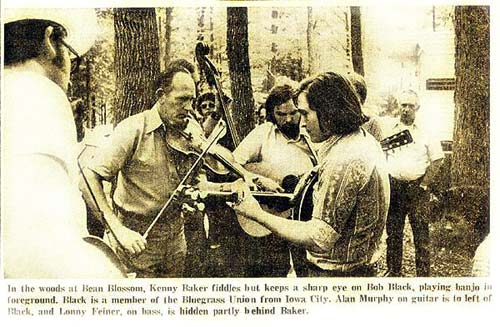 |
|
1973 Kenny Baker jam out side of Jim Peva's Camp Bean Blossom |
In 1997 Jim Peva made available to me his collection of reel to reel tapes he had made
over the years, of Bluegrass around Bean Blossom. As I had done with over 1500 hours
of live Bluegrass shows in the past, I proceeded to get these reel to reel tapes to a digital
format at the same time as I logged the contents of each tape. One recording stood out
in the collection as very special. This short section of tape was made one of the times that
Bill Monroe and the Bluegrass Boys came to Jim Peva's house for a dinner. It was after
the dinner on December 14, 1968 that Bill Monroe made this gift for Jim Peva. We all
can be thankful for Jim Peva's foresight in having a recorder available and recording the
following songs:
1) Christmas Time's A-Comin
2) A Beautiful Life
3) Big Sandy River
Click here to play or download the 7 meg mp3 audio file of that night:
http://www.rentalfilm.com/MonroeChristmas/BillMonroeChristmasAtPevas.mp3
if that link seems slow a second site is:
http://www.candlewater.com/MonroeChristmas2/BillMonroeChristmasAtPevas.mp3
This short segment of tape cuts across the time to bring us to another Christmas session
in 1968 in Indiana. We have Jim Peva to thank both for making the recordings and for
making them available for us to hear. We are also be thankful to the members of
the 1968 Bluegrass Boys: Bill Monroe, Roland White, Kenny Baker and Birch Monroe
who appear on this tape, for the musical gift to Jim Peva's family making this recording.
When I decided to post this audio in the form of an mp3 file I contacted both Jim Peva and
Roland White for the following three way phone call interview. The interview begins after both
have just heard the mp3 file linked above. Jim Moss (12-11-05)
![]()
JIM MOSS: So Jim, what do you remember from this recording?
JIM PEVA: Well, I remember we had some friends in and we had Bill and the guys up, and as I recall
the people that were there that night was Vic Jordan and Kenny Baker... and Roland of course... and Bill and Birch.
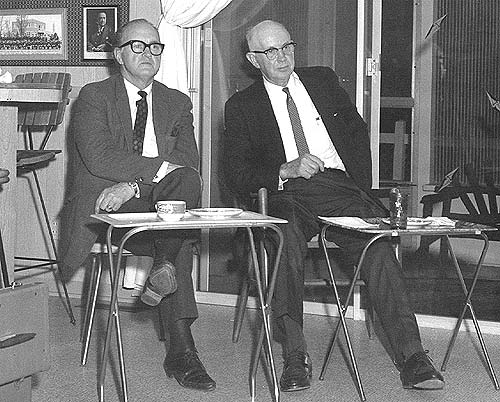 |
|
J Edgar Hoover... Bill Monroe and Birch Monroe at Jim Peva's 12/14/1968 Photo Copyright Jim Peva |
Birch Monroe is there. I can hear him singing on that one song. And James Monroe was here I think.
I think that was the group from the Bluegrass Boys, if I am not mistaken.
Do you remember anybody else Roland?
ROLAND WHITE: I don't remember anyone else. I just remember being at your place one time and
I recall it was that time of the year.
JIM PEVA: Yeah. Long long time ago.
ROLAND WHITE: Yeah, well, 1968 is a long time ago.
JIM PEVA: Yeah! (laughs)
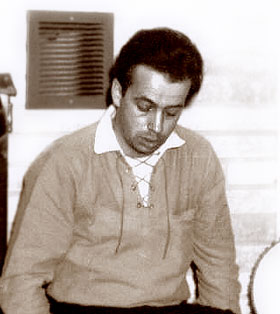 |
|
Roland White at Jim Peva's 12/14/1968 Photo Copyright Jim Peva |
JIM MOSS: I don't hear a banjo on the recording, but I guess he was there...
JIM PEVA: Vic was there, but he didn't have his banjo with him. I had one, but he didn't like the
neck on it, so he didn't play.
JIM MOSS: So what led up to this?
JIM PEVA: Well, you say that was December 14th?
JIM MOSS: Yeah.
JIM PEVA: Well, it couldn't have been after a Bean Blossom show because it was already closed.
ROLAND WHITE: Uh... yeah, I was thinking about that when I was talking to Jim a while ago.
The Bean might be closed if not earlier.
JIM PEVA: I think they usually close sometime in November.
ROLAND WHITE: Yeah, because it got cold in that place.
JIM PEVA: Yeah, I think perhaps you guys must have been playing in Indianapolis some place.
ROLAND WHITE: That could be... That could be, cause I know around the holidays we
played around Indianapolis and Minneapolis, of all places.
JIM PEVA: Is that right! (laughs)
ROLAND WHITE: Yeah.
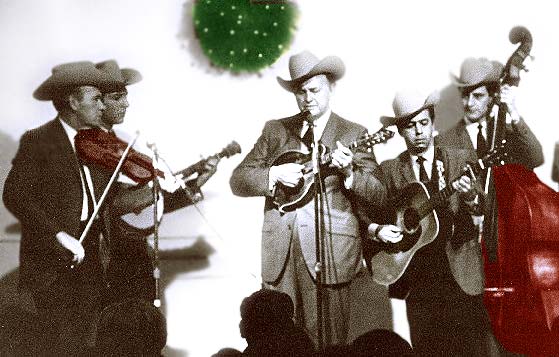 |
Bill Monroe and the Blue Grass Boys, Christmas, 1968: Kenny Baker, Vic Jordan, Bill Monroe, Roland White, James Monroe. Photo courtesy of Old Town School of Folk Music |
JIM PEVA: Well my guess, uh... I think I uh... I guess I was in touch with somebody who knew
you were going to be playing in Indianapolis and invited you out for supper... or something.
That must have been it.
ROLAND WHITE: Yeah.
JIM MOSS: So Jim, you just had a tape recorder handy and...?
JIM PEVA: Yeah, I had an old reel to reel that I use to take down to Bean Blossom to tape Bill's shows.
That's what... I must have taped it on that.
JIM MOSS: An old Wollensak?
JIM PEVA: ...yeah, it might have been a Wollensak, yeah!
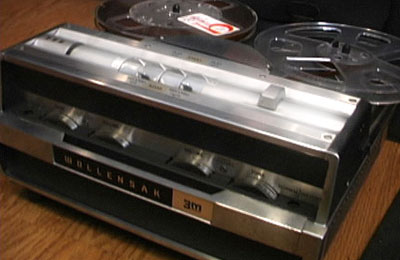 |
JIM MOSS: Yeah, well that's great! So, how long did they stay there at the house that night?
JIM PEVA: Well, as I recall, my wife made supper for everybody. And uh.. It was after we'd
eaten that we gathered in the family room and they got out their instruments and played four
or five numbers... as I recall. And we just had a nice visit and had a good time.
ROLAND WHITE: Yep, Bill loved to be invited somewhere to someone's home to eat home cooking.
And he didn't mind to play for that supper.
JIM PEVA: (laughs)
ROLAND WHITE: And he loved to play for his supper.
JIM MOSS: Is that right? Did you guys do it very often?
ROLAND WHITE: Yeah we did it a few times. Specially out in California... someone would be
inviting him over. He and the band whoever would show up. The whole band wouldn't come.
I know a few times when Bessie was with him and they'd come over. And of course she wouldn't play
but he would... you know... "Well lets play some music" (Bill). He'd pick up the mandolin...
He would always bring his mandolin and he would play it if they asked or not.
JIM PEVA: He liked home cooked meals.
ROLAND WHITE: Oh yeah.
JIM MOSS: So... what? Bessie would sing with him I guess? You know, be able to do harmonies with him...
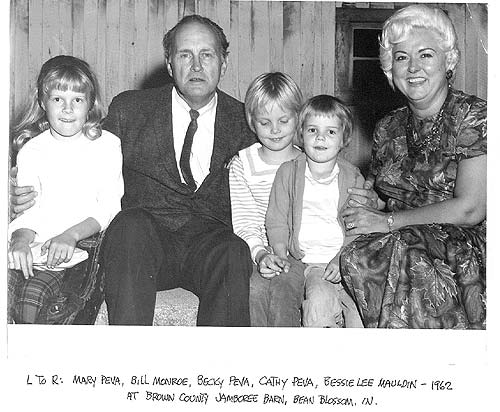 |
|
Photo Copyright Jim Peva |
ROLAND WHITE: No, she never would sing or play at these events.
This is... well when I am talking about Bessie traveling with him, it would be back as far as
nineteen sixty... one... sixty two.. Well, 1961 because that was the last time I saw them.
I was drafted in the army in 1961 and came out in 1963. And then after that, at that time
he had James Monroe on the bass. Bessie wasn't there anymore.
JIM PEVA: I think that... I took some pictures that night. I remember one picture that James Monroe
took of myself and Bill, C.D. McClary and Birch, I think. And some other pictures from that evening.
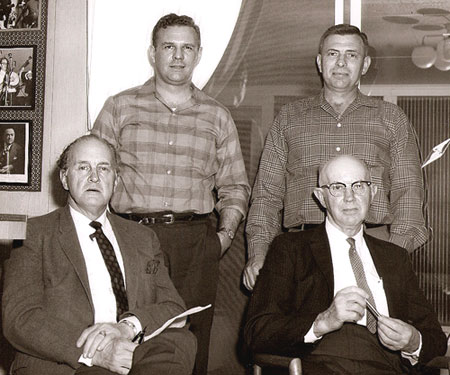 |
|
L to R (front): Bill Monroe, Birch Monroe, (back): Jim Peva, C.D. McClary at Jim Peva's 12/14/1968. Photo Copyright Jim Peva |
James was sitting on the couch fooling around with the guitar. I think at that time he was playing bass
in the band, wasn't he?
ROLAND WHITE: Yes, yes, uh huh.
JIM PEVA: And he was just pickin up the guitar... and just kinda learning a little on the guitar.
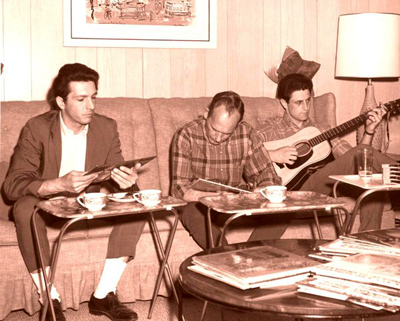 |
|
Vick Jordan, Kenny Baker, James Monroe at Jim Peva's 12/14/1968. Photo Copyright Jim Peva |
ROLAND WHITE: Right. Cause he was the guitar player when I left Bill, in February of 1969.
JIM MOSS: So this night was just before you left.
ROLAND WHITE: Yeah. I was only with him from May of 1967 to February 1969... about 2 years.
JIM MOSS: Ah. Well that's... a... Standard Run. (laughs)
ROLAND WHITE: Yeah... (laughs) Seemed like a long time at the time.
JIM PEVA: Yeah, I bet. (laughs)
ROLAND WHITE: Yeah, but I... It was a great experience for me cause he was my mandolin hero
and I got to see him, first hand... play the mandolin. You know... and uh... That was a really...
I learned a lot... more than I did in all the years I listened to him on record.
JIM MOSS: Yeah, there was a... I have been in front of him when he would be teaching me tunes, and
it was way different... there is a huge dynamic that he tried to transmit. When he would teach me a song
and I would try to get the melody, but he didn't want you to just play the melody. He really was thinking
about all the strings and all the voicings going on at one time. It was a real broadband kind of thing.
He would look across at me and say, "What's a matter boy, can't you hear that?". And I would have
the melody, but there was a whole lot of other stuff that he wanted you to get.
ROLAND WHITE: That's how I learned to do that. Course, I didn't... We never sat down one on one
and where I got a lesson, you know I never did. After watching six or seven hours, I was able to
solo driving the bus. Then I was his night driver. So he hadn't taken out his mandolin on the bus at all
just at night time, and I'd drive at night. I had driven for several months And he'd love to sit up at night,
but he would just sit there. Sometimes Virginia would be there with him. I'd ask him a question, but he
never had a whole lot to say. So one day I said, "how come you.. don't you ever get your mandolin out
and play it, while we're traveling?". He said, "Well, if you'd get it out for me."
JIM MOSS: Really!
ROLAND WHITE: And I thought about it. "You mean, go back there... and get your mandolin out from
under your bunk and bring it up here? You want that?"... (Bill) "Uh huh!"
JIM PEVA: (laughs)
ROLAND WHITE: So by golly, the next chance I got... I was driving... and the next chance I had to
pull over, I pulled over and I went back there and got his mandolin and set it on the arms... on the arms
of the chair next to him, across the isle, which was directly behind me. And in a few minutes he
got it out and he played for 2 hours. He just played. Every so often... he would comment on what
he was playing. That was the way it was all the time I was driving. I was driving at night, you know.
JIM MOSS: Yeah, that's great!.
ROLAND WHITE: Great lessons. I'd ask him about something he did... and he would play it.
JIM MOSS: Yeah, he always seemed pretty willing to show you. Was that your guitar you played
then or was that Bill's?
ROLAND WHITE: No, that was mine.
JIM MOSS: uh huh... What was that?
ROLAND WHITE: It was a late 40's D28... that I got from a friend of mine, John Kaparakis from
up in Washington DC. He was a friend. We met him back in the Kentucky Colonels days, back
in 1964... uh sixty three and four and uh... He had a guitar... I had a D18 that belonged brother Eric.
It was his wife's guitar D18 that she had inherited from her father. So I came here with that then I
got this guitar and sent it back. And it was ah really nice sounding guitar. It was beat up really really bad.
It looked like a bar room guitar. Anyway, I got the guitar and I took it to somebody here in Nashville
and set it up nice... but, it really sound good. And when I, when I left Bill I traded it to Randy Wood
for my Randy Wood mandolin. All I had in the guitar was $250. That's all it cost me. Then I gave
Randy another $200 bucks and I got this mandolin. I am, still playing it.
JIM MOSS: What was your action like on that guitar?
ROLAND WHITE: Ordinary.
JIM MOSS: ah... Was it... How high was it?
ROLAND WHITE: Not high at all. It was high at first, but I couldn't play it.
JIM MOSS: uh huh..... Your thinking well under a quarter of an inch then?
ROLAND WHITE: Oh I don't know, I don't know, but I mean, it was playable. It was hard to play.
So uh, you know... I had it set up once and it was a good job and it was a lot better.
JIM MOSS: Tell me this, when you were playing guitar with Bill, you didn't pay much attention
to the height of the strings or anything like that?
ROLAND WHITE: Well, yes. It was too hard to play. Clarence went through that thing with
his old Herringbone. You know the action is too high to play, but you couldn't fix it because
the top had bubbled up on it. The top was too damaged. And he played mostly his leads on
the D18.
JIM MOSS: He did?
ROLAND WHITE: Yeah, all his leads were pretty much on the D18 not the D28.
JIM MOSS: Really, that's incredible.
ROLAND WHITE: He couldn't play it.
JIM MOSS: So when you were playing in the Colonels and when you were here in Berkeley...
ROLAND WHITE: Well, he had them both with him. If he was only going to be playing rhythm
he would stick to his old Herringbone. Sometimes he would play something simple like Wildwood Flower
with the capo on the second fret, but that's about all.
JIM PEVA: You mentioned what you had in that guitar. The fella who was here at my house
that night you folks were here, C.D. McClary, sold James Monroe a D28 for $300 bucks... and James
still plays it today.
ROLAND WHITE: Oh, so he didn't buy that from you? The guitar that James plays?
JIM PEVA: No it was a friend of mine, McClary that sold it to him.
ROLAND WHITE: I see. I knew it happened when we were visiting or...
JIM PEVA: Shortly after that. Those guitars are going for considerable more than that now...
ROLAND WHITE: Oh yeah! (everyone laughs). Well darn... Yeah, I know James still has the same guitar.
JIM PEVA: yep...
JIM MOSS: So, Jim, did Bill come by your house very often?
JIM PEVA: I can remember, he was here either three or four times. He was once here with Virginia.
I think just he and Virginia came up, that was from Bean Blossom. He was here another time
when Doug Greene was playing with him.
JIM MOSS: Was that about 1973 then, right?
ROLAND WHITE: No uh... it was... I replaced Doug Greene in 1967.
JIM MOSS: uh huh
JIM PEVA: yeah
ROLAND WHITE: That was before... before I joined the band.
JIM MOSS: This was on guitar?
ROLAND WHITE: yeah.
JIM MOSS: Didn't Doug Greene play bass later on?
ROLAND WHITE: Well, he filled in for James a couple of times, but I don't think he was hired on.
Now maybe after James left he could... Yeah, maybe he did.
JIM MOSS: Because Joe Stuart, you know a lot of the shows out here on the west coast, had
Joe Stuart on guitar, and I thought it was Doug Greene on the bass.
JIM PEVA: I remember he did play bass for awhile, yeah.
ROLAND WHITE: Yeah, he did. Ok, I know that while I was still with Bill a couple of times
he filled in for James. That was sometime in 1968.
JIM MOSS: You notice Kenny's fiddle, its not... I don't think he is playing Blackie on there.
You know his fiddle Blackie, the dark fiddle? I think he is playing a different fiddle. Its got a
different sound to it. It doesn't have that syrupy sound. You can hear it's him, but it must be
before he got that fiddle.
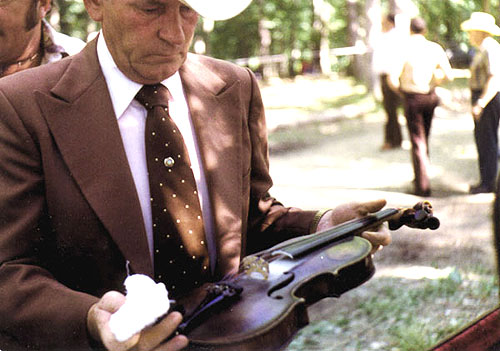 |
|
Kenny Baker and Blackie Bean Blossom 1978 Photo Copyright Jim Moss |
JIM MOSS: You know the fiddle he played after that. Sometime in 1969 and 1970 his fiddling
became different. It became real fat sounding. It is definitely him on the recording.
(He told me that he had met a classical player in DC who showed him some things about then too)
ROLAND WHITE: I thought the tunes that you sent me were too fast. (laughs) (the file linked above)
JIM MOSS: Too fast?
ROLAND WHITE: Yeah, they were played too fast.
JIM MOSS: Man, you should play with Frank Wakefield and I sometime.
ROLAND WHITE: Oh, well, yeah, but... (laughs it up)
JIM MOSS: The tape was probably in pitch... Them Wollensak recorders were pretty on.
Where did all those Wollensak recorders come from? I seem to remember them in grade school.
How did them things come about anyway, did the government get this huge purchase of Wollensak recorders?
Jim? You were working in the police force back then, right?
JIM PEVA: Yeah, in 68 I was still with the State Police Department.
JIM MOSS: Did you get that from...
JIM PEVA: It was a borrowed tape recorder. I never owned one, I don't think. I borrowed it from
somebody. One of them was a... some of those tapes are Stereo. ... and uh.. Some of them are not...but they
where always on a tape recorder I had borrowed from somebody. And the old reel to reel. I still got some
of those old reel to reel tapes. I don't know if they deteriorated or...
JIM MOSS: No. No they didn't and that's where that tape came from, is from the
reel to reel that you lent to me. The reel to reel tapes from that era were stable and last. It was the
pro audio tapes from the late 60s and mostly the 1970's that would get gummy. To play them you
need to bake them in the oven, carefully of course. That is what happened to the master tapes of
the album I did with Jesse McReynolds, Tanyards. Those tapes needed to be baked to dry out the
emulsion before it would slide past the heads and guides.
JIM PEVA: That's what Frank Wakefield does with his mandolins, isn't it? (laughter breaks out)
JIM MOSS: Yeah! (laughter breaks out)
ROLAND WHITE: I was just thinking of that myself... !
ROLAND WHITE: Now there... there is a fella there, Frank Wakefield, I really enjoy him... but one time
1964, the Kentucky Colonels where playing at the Newport Folk Festival and he was there. He was with...
I forgot the name of the group now, a New York or New Jersey group... Anyways then we had talked
already about the introduction to Roanoke on the mandolin, like Bill played. He said, "Oh I know it".
And uh... he said I'll show it to you and he showed it to me. And he played it exactly like Bill.
That boy, I could never learn it from the record. I had Bill show it to me one time. Bill, I said, why don't
you show me one sometime, you know? Here he goes and lays into it dida dida dida dida dida dida.
I said, "can you slow it down a bit?" And he says "What do you mean?". He tried a bit slower.
Well I could never pick it off there, but Frank Wakefield played it through real easy. Then he said,
"Here lets play it together" and he showed me how to do it. It is really simply its just the emphasis on
certain notes, you know.
And the first time that Frank ever came around, later on when I was working with Bill. We were still
on the bus and we could see him coming. Is that that Wakefield boy? Now that Wakefield can
really play the mandolin. And they sat around and jammed for hours, well for a long time.
Then it happened again years later... Bill just loved to see him come. He said, "I love to see that
boy come, he can really play that mandolin". And Bill would do something and Frank would just
kind of... mock him, just like him. He is the only guy I know that could play Monroe just like Monroe...
and he did.
JIM MOSS: Yeah, there is a story about Frank talking backwards to Bill. Where he was
going up on stage with Bill after playing on the bus for a few hours. I guess Bill decide to
invite Frank up to play some. Each would take a break and shine a little. So after the
first tune Bill said, "Frank that is real fine playing you did there" and Frank said, "thanks Bill".
Then Bill said, "What did you think of my playing?" and Frank apparently said, " that's real bad Bill".
Of course Frank was talking backwards, but Bill just stood straight up and said, "BAD?".
The band just broke out in laughter. Monroe kept saying, "I can't believe you said BAD! BAD?!"
You know, Bill said to me... "No one has ever gotten closer to my music than Frank Wakefield... But he's crazy!"
Old Frank is about as crazy as a fox you know...
So Roland would you play mandolin with Bill? You were playing the mandolin then. Did you ever sit
around and play tunes with him?
ROLAND WHITE: Well maybe one time on the bus, I happened to have my mandolin with me.
We probably played a little bit.
JIM MOSS: Did you rehearse on the bus at all...
ROLAND WHITE: Nooo not really. Never really. I don't know that we rehearsed one time.
JIM MOSS: Really?
ROLAND WHITE: Before recording maybe "Virginia Darlin", or "I Want To Go With You"
or something like that before a session where we really sang high on.
JIM MOSS: What sessions did you actually do with Bill?
ROLAND WHITE: Now lets see... We started off first with Byron Berline and he did
Sally Gooden...
JIM MOSS: That's a good session. You guys nailed Sally Gooden.
ROLAND WHITE: Gold Rush. Gold Rush was new, new tune. Whatever Byron did, maybe
two more. And then we went in and did more later, Virginia Darlin, Train 45, Walls of Time.
I think there were 8 or 9 cuts.
JIM MOSS: When you... So did you sing on Walls of Time at all?
ROLAND WHITE: Yeah, I sing the lead on that. One time we were back stage and Bill
said, "do you know Walls of Time?". And I had learned it because Lamar Grier gave me a
tape of both Bill and Pete Rowan singing it. That's how I learned it. So we... one time we
did the Opry and we would run down a tune occasionally that he would ask you to do.
So we went over the tune and it was alright, but I wasn't thrilled by it. So we played it
that night on the Opry. Then after we did it then he said, "We gonna record that".
And I said, "well you know uh... You know I feel... Would you consider maybe getting
in touch with Pete Rowan and have him record it cause you all sing it really well together."
And he just, boy, he just looked up, you know that look he gets you know when his jaw
sticks right out there. He went, "HUH!". I wouldn't have minded it at all because I couldn't
sing it like Pete. They sing it really well together. ANYWay, so we never discussed it.
So here we are in the studio and we are going to do "Walls". We sung it three or four times
and he was telling me that one of the notes that I hit somewhere at the end of either the
chorus or the verse wasn't right. And he'd show it to me and ... and... and so I did it.
And so we got into the studio, we recorded it and I was really really intimidated by the
whole flap. And we recorded it and then when it was over with he said, "Lets try that again".
So we did it one more time. So that one part of the line where he wanted it different...
Well, he just didn't want it to sound like Pete Rowan. I am pretty sure now, thinking back
on it. So we recorded it a second time and got done he says, "you sing it too hard".
JIM PEVA: laughs...
ROLAND WHITE: So I said, "well uh... gee I don't know. I guess I could try to..." (Roland)
"No we're finished!" (Bill).
JIM MOSS: Really!
ROLAND WHITE: Yeah, he just walked away. And so the producer came later and
he knew I was... and he said, "Roland, this will be in the can. It will be released someday.
Probably not... "
JIM MOSS: This week!
ROLAND WHITE: But he said, "He'll never get it right". And it was released later. And he
went back again after I left with James on guitar and they recorded it. I know that that was the
first release that came out of it... Father and Son. Quite a few years later.
JIM MOSS: Yeah, I think there was some dispute over who wrote Walls of Time.
Peter really did a great job on those bass runs. Did you do the bass runs like Pete?
ROLAND WHITE: Well, I think I did it pretty close to what Pete did. I tried anyway.
You have to remember, I wasn't a guitar player till that band. Well, I knew the cords...
I knew the cords to all the songs. I knew the lyrics to most of everything he recorded
to date. You know we never did... half of what he recorded in the past, but...
And uh... And I had already, before I ever got this job a year before that, back in 64 or 65,
I had to fill in for his guitar player who wasn't there. And so you know, he knew what I
could do. yeah know... And he uh....
JIM MOSS: Well, you knew some pretty good guitar players!
ROLAND WHITE: Huh? Oh yeah right! Clarence would have probably gotten
the job, only Clarence wouldn't sing.
JIM MOSS: Oh is that right?
ROLAND WHITE: Yeah, Clarence would sing a baritone part and he would sing a
duet with me you know. I mean, a duet like he wouldn't have sung with Bill.
And at this time, in 67 he was into, you know we had broken up already. The band had
disbanded and he was into more stuff and a lot of sessions and that's what he had to do...
but anyway.
JIM MOSS: Yeah.
ROLAND WHITE: I don't know what he would have done.
JIM MOSS: So those were the only songs you recorded then?
ROLAND WHITE: There were about nine... eight or nine, I am not sure.
JIM MOSS: So when you would go to a show, in the bus... in a car?
ROLAND WHITE: In the bus, right.
JIM MOSS: And this was not that newer bus that he had either...
ROLAND WHITE: No, it was the old Bluegrass Breakdown.
JIM MOSS: So you wouldn't sit aside and work on harmonies or anything?
ROLAND WHITE: One time we got together, one time, maybe twice, over at
Caroline's. He had a little den there and that's where we got together... to go over
the tunes you know... before a session. We'd run down a tune at the Opry sometimes,
before we went on.
JIM MOSS: Boy, what a missed opportunity, with all that driving. I mean, when Frank
and I drive anywhere we sing the entire way. Frank will have his mandolin out and
all of us will work out all these harmony parts. We work on instrumentals back at our lodgings.
(Jimmy Martin said in an interview I did, that when his band started using a bus this all stopped.)
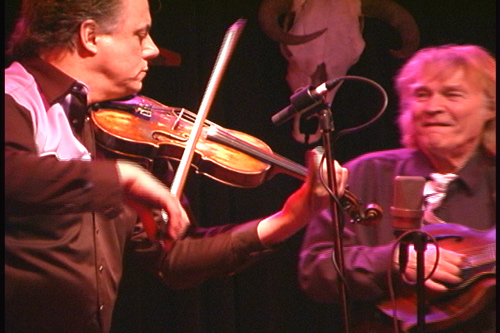 |
|
Jim Moss and Frank Wakefield (with Jim Lewin out of photo). Tractor Tavern, Seattle Washington 02/10/2005 Copyright Jim Moss Cameraperson Derrick Reed |
ROLAND WHITE: He would play his mandolin a lot and the more he would come up with
tunes he would say, "This is a tune that my Uncle Penn played. It is one I learned from Uncle Penn".
At the time, he was working on his Uncle Penn album... to be recorded later. We did some of the
tunes. He and Kenny would get together and play them you know and I would back them up.
Went back stage or something, never had a full blown rehearsal. And uh.... Sometimes Kenny
would get out his fiddle on the bus and they would play together you know... but nobody was
calling it rehearsal. He just didn't want anybody interfering with he and Kenny, you know,
cause he was showing Kenny stuff. And uh... that was in the works, that album, you know.
JIM MOSS: So would this happen a lot?
ROLAND WHITE: Not that much... not that much. Not as much as it should have.
JIM MOSS: That was a great album. I don't think it is out anymore. Maybe the material
is on the Bear sets... The individual tracks that is.
ROLAND WHITE: Yeah right.
JIM MOSS: That's incredible, to expect someone to get up on the stage, with Monroe of all people,
without ever rehearsing the material.
ROLAND WHITE: Well you know... (long pause..) You just get up on stage and sing. Only one time
did he ask me if I could sing on a song that I didn't know. It was one of the gospel tunes that I didn't
know. One time he asked me, "can we do this?". Well I just said, "Well I really don't know it Bill",
"I know I could sing it, but just don't know it." I knew all the others I knew. I knew all of them.
JIM MOSS: From records...
ROLAND WHITE: Yeah. I had done all that stuff from 1955... 56. We sang all that stuff at one
time or another in the Kentucky Colonels... I think that was how we learned all that Flatt & Scruggs
stuff, Stanley Brothers, Reno & Smiley a lot of Reno & Smiley, Jimmy Martin songs... I did some of his stuff.
JIM MOSS: Well, then this was an unusual opportunity to actually play in an informal atmosphere.
At this house...
ROLAND WHITE: Oh yeah. yeah.. We did that a couple other times too especially at Tex Logan's.
We went to Tex Logan's every year. Well, every year I was there. It had been happening in years before
I was there too. They had them previously, Pete Rowan had been there, Gene Lowenger and those guys.
Tex would cook this big big pot of Texas beans...
JIM MOSS: Yeah, yeah... I had some of those at Bean Blossom.
JIM PEVA: yeah... Barbequed beans!
ROLAND WHITE: Yeah, and uh... We would go up there and spend the night... Play in the afternoon, eat.
Play again at night. Musicians from the New York area would come there. A whole lot of them.
JIM PEVA: Is Tex still alive Roland?
ROLAND WHITE: Yes, I talked to him last year. His daughter Jody found me on the internet and
she emailed me. We talked about being at his house. The last time I was there was 1969 before I
left the band. Well, I had quit the band and turned in my notice on New Years Eve of 1968.
Well, here we are on the Opry close to New Years Eve, I don't know if it fell on the same weekend
or not. Bill comes up to me, "Roland, you know we are going to Europe in a couple of weeks and
I don't have a new guitar player... could you go?". Well, NOW he tells us. I guess James knew it,
but I don't think Kenny knew it either... and I am pretty sure Vic Jordan didn't know it, but everybody
was really upset about it. So about mid January here we are going to Europe, and I went.
So we would play the Baltimore area then we would go up to Tex Logan's house in the back yard
and have baked beans. They took us to the airport we went to Europe and we came back.
And uh... on the way back, stayed there over night. I called home talked to my wife here she told me
that... "Oh Lester called". I had already approached Lester about a job, right after Thanksgiving.
I said, "you know I am going to be leaving Bill's band I am going to turn in my notice next week, and
you know, you ever considered using a mandolin player and tenor singer again I would like to give it a try.
and he said, "Well, you know, I will keep that in mind". Anyway, got back from Europe gave my
wife a call and asked what Lester's call was about. She said, "Oh you haven't heard? Lester and Earl
broke up". I remember dropping the phone. Peggy had let me use the phone, they were downstairs.
The phone went clunk clunk. She knew what it was. Well she said, don't call now... They broke up
and they won't be doing anything for about a month. Don't call them now! When we get home, call them.
That was the last time I was at Tex Logan's house. I seen them quit a bit at festivals, Pete and Jody, Peggy.
JIM MOSS: And Laura, right?
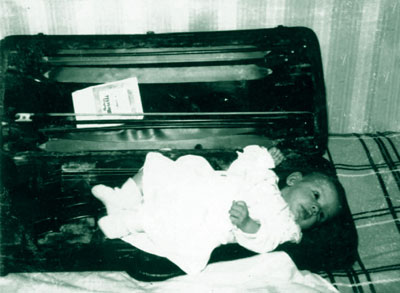 |
|
Laura Logan in Tex's fiddle case. Copyright Laura Logan |
ROLAND WHITE: She was not around as much. She was in college I think.
JIM MOSS: She came out to see us in Los Angeles.
ROLAND WHITE: Jody use to come to a lot of the festivals in the 70s.
JIM MOSS: Yeah, I saw here at Bean Blossom in the 1970s.
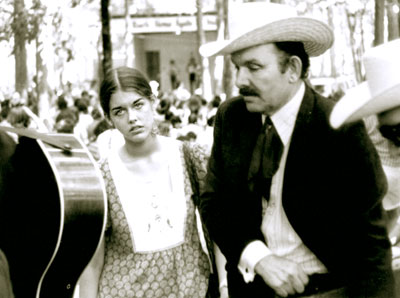 |
|
Jody and Tex Logan Bean Blossom June 1973 Copyright Jim Moss Photo by Jim Moss |
ROLAND WHITE: Come along Jody!
JIM MOSS: Right, "Come along Jody", Tex's fiddle tune. Yeah, she had
a crush on Randy Scruggs as I remember.
JIM MOSS: I had hitch hiked to Bean Blossom from California and actually I met
Jim Peva and his daughters and then I met... there were a couple of families
there who had daughters... I didn't know anybody and Jim took me in for awhile.
Jim's daughters had a crush on the members of another band. Jim is like the
mascot of Bean Blossom.
JIM PEVA: (laughs) yeah... I'm the elder statesman down there.
ROLAND WHITE: How many years... have you missed any of those?
JIM PEVA: No. No been to all of them Roland. Next year it will be 40 in a row.
ROLAND WHITE: Oh my gosh. Is that 1967 was the first? In the barn.
JIM PEVA: Yeah... in the barn.
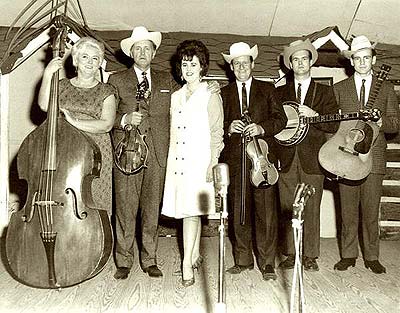 |
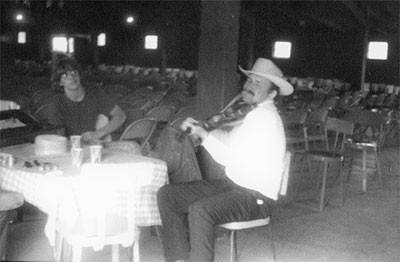 |
The Bluegrass Boys... and girls. Bean Blossom Barn June 1963 Photo Copyright Jim Peva
|
Tex Logan (notice the steam in the barn) Bean Blossom Barn June 1973 Copyright Jim Moss Photo by Jim Moss |
ROLAND WHITE: yeah... Spring of 68 we started going out there and cutting down trees,
putting up the stage. That as so hard.
JIM MOSS: I liked that little stage.
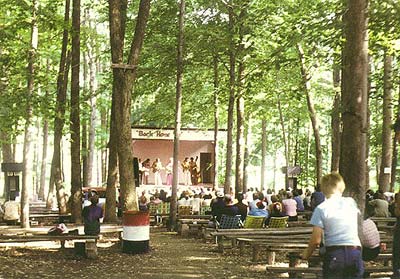 |
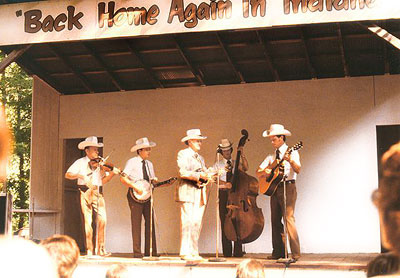 |
Wilma Lee Cooper Bean Blossom Stage June 1975 Copyright Jim Moss Photo by Jim Moss |
Bill Monroe & the Bluegrass Boys Bean Blossom Stage June 1978 Copyright Jim Moss Photo by Jim Moss |
ROLAND WHITE: Oh yeah... That was built by Bill Monroe and all his Bluegrass Boys. I mean they
cut down trees. Got them onto the back of the truck and took them to the mill. Cut planks that would
go in there. Haul them back there. Haul them down to the stage area. Put up one board at a time... a nail at a time.
JIM PEVA: Did Calvin Robins work on that stage?
ROLAND WHITE: Uh, he was there a lot. He was there a awful lot. He helped... He wasn't there during..
We would go there and spend a week. And he would come like on weekends.
JIM PEVA: Did you guys stay in those little cabins?
ROLAND WHITE: Yeeaah (laughs).
JIM PEVA: (laughs)
ROLAND WHITE: I was in a cabin with Kenny Baker. Oh mercy...
And we would shower in the barn.
JIM PEVA: Or go down to the pond and wash up?
ROLAND WHITE: No, I wouldn't have gotten in that pond. No, we.... They had a hose up at..
a hose and we would just get wet with cold water. There wasn't any hot water. And bathe in the
barn on one corner of the barn there, you know... no curtain or anything...
JIM PEVA: yeah... (laughs)
JIM MOSS: Boy!...
ROLAND WHITE: Our suffering...
JIM MOSS: It was humid enough you could take a steam bath in the barn there. I have some
pictures and there is like a fog in there, those pictures of Tex Logan... It looks like London.
So that little stage was really nice...
ROLAND WHITE: The barn?
JIM MOSS: No, not the barn.
ROLAND WHITE: The outdoor stage! Yeah, it was great.
JIM MOSS: Yeah... They tore that barn down and...
ROLAND WHITE: aw.. They shouldn't have done that.
JIM MOSS: No... No that was a piece of history and there was that wall they had back there
with all those signatures on it.
JIM PEVA: I don't know what happened to that. That would have been a priceless collectors item,
that wall with all the autographs.
JIM MOSS: I bet Jim's got it.
JIM PEVA: No, I don't!
JIM MOSS: Yeah, that would have been something. That had everybody on it, that and that truck.
That old truck that had signatures on it.
JIM PEVA: Yeah, it's still there.
JIM MOSS: Yeah, it's got Jim & Jesse on the front of it.
ROLAND WHITE: Is that still there that old truck?
JIM PEVA: Yeah, it's sinkin down into the dirt, but it's still there.
JIM MOSS: And all those furnaces?
JIM PEVA: There was all those stoves? Yep... Yeah, Birch use to fire those up
every fall. Yeah, he would be... You know Birch always had a white shirt and tie... but
he would chop wood or do plumbing or anything and never took off that white shirt and tie.
JIM MOSS: Really? So he did it all with a white shirt and tie on.
JIM PEVA: The only time I ever saw him without a white shirt and tie was when I visited
him in the hospital once.
JIM MOSS: Did he work for the schools or something down there?
JIM PEVA: Who Birch? He worked at a place called Twig Industries in Martinsville I think.
I am not sure what they did, but they manufactured something.
JIM MOSS: Yeah, that was something. The barn was kind of rough on the audio. I mean, a lot
of the recordings sounded good, but to hear yourself up there was a little... kind of a rumble and
an echo together. It sounded like you were in a subway tunnel.
ROLAND WHITE: Well, because the stage was set in a smaller area, I think.
JIM MOSS: But, boy it was fun to be able to play there. When I went there first in 1973 sitting
in with a band, but I first noticed it in 1975 and then later, there was a fan with wooden blades on it
that they put on the stage. And all these recordings we had heard from the barn had this
swishing knocking sound in them. Turns out this sound came from this wooden fan that they
would put up on the stage.
ROLAND WHITE: Is that was that was?
JIM MOSS: Yeah, these blades going by of this wooden fan. You'd think they would have fixed
it, but it is part of history now. Did you bring that fan in there Jim?
JIM PEVA: No...
JIM MOSS: What was the first time you were there, Jim?
JIM PEVA: Oh... 1961. I went down there to hire Bill to do a show for... The state police had
a banquet. I hired him to come from Nashville and bring a comedian, a guy named Rusty Adams
was a comedian, and the full band and the whole price was $300 bucks. From Nashville to
Terre haute Indiana and back, $300 bucks.
ROLAND WHITE: That was when gas was still...
JIM PEVA: Bessie Lee's station wagon had the bass fiddle on it.
ROLAND WHITE: The Oldsmobile, yeah. They came out to California with that thing.
Five people in it and all. In the late 50s and early 60s that was what they drove. My dad would
look at it and say, "boy, I don't think that thing will make it back". It was really loaded down.
JIM MOSS: I remember one time they drove out here in a station wagon in 1978 or so.
The bus was not working. That must have been hard. These days we fly into a town and
get a SUV or a minivan and it is a lot easier. but at least it must have got 10 miles to the gallon.
JIM PEVA: Well, its great to talk to you Roland, and Jim.
ROLAND WHITE: Well Jim, and Jim happy holidays to you.
JIM MOSS: Absolutely, same to both of you and thanks for participating in this little session.
... end
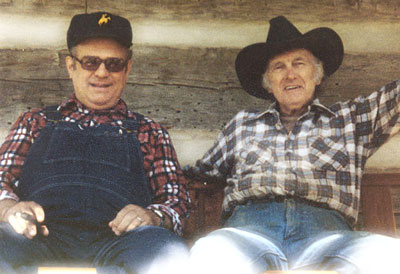 |
|
Jim Peva and Bill Monroe at Bill Monroe's Log Cabin home 1986. Photo Copyright Jim Peva |
|
|
CLICK
HERE TO: Return To The INTERVIEW Listings
Roland White's web
site
CLICK
HERE TO: Return To PHOTO Page Listings
| All Rights Owned by Mossware LLC. |